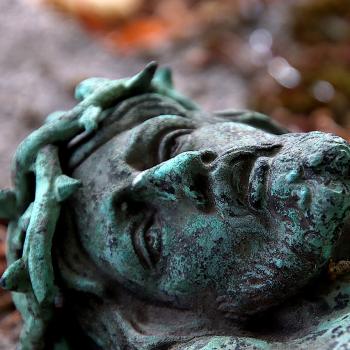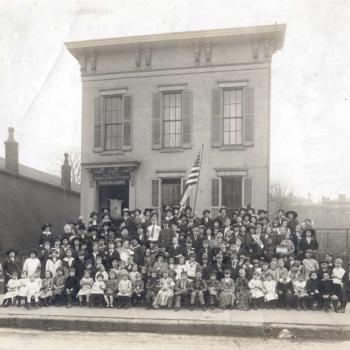This blog serves a number of purposes. It helps Christians think more deeply about the history of their faith, and to understand its relevance for the church today. It creates space for some Christian historians to think out loud about their research and get feedback from prospective readers.
But on this last day of November, The Anxious Bench has another, equally serious mission to fulfill:
To help you buy Christmas gifts for the history buff in your life.
I know the urgency and complexity of the task: as a history buff who knows he’s hard to shop for; and as someone who wants to give good Christmas presents to his loved ones but doesn’t really enjoy shopping.
So I asked a few of our contributors to share some recommendations. Predictably, we mostly thought about books to give… but one of us was more creative than that.
For the ancient history buff who may or may not want another book…
Gifts for history buffs do not have to be classy, but they do have to have a good story. Sometime in the 8th century BCE, in a Greek colony off the coast of Italy, someone was having such a good time at a party that he scratched a little ditty inside the host’s fancy drinking ware. By accident of survival, this inscription is one of the earliest examples of anything written in the Greek alphabet (and this makes it Christmas appropriate!). You can now get the coffee mug version of it for your favorite history fan. Or you could consider this fancy Colosseum-shaped salt and pepper shaker, which is a stocking-stuffer-sized reminder that we are called to be the salt of the earth. Kyle Harper’s newest book, Plagues Upon the Earth: Disease and the Course of Human History, is a fantastic sequel of sorts to his The Fate of Rome: Climate, Disease, and the End of an Empire, which I was gifting to everyone last year. Both books provide a historically-grounded reminder of the theological truth that this world is not our home. Finally, for anyone tired of the Elf on the Shelf, consider the elf’s Jewish cousin, Mensch on a Bench (but is his bench an anxious one?). Not included: unpacking the baggage related to commercializing Jewish religion and culture in America. (Nadya Williams)
 For the history buff who particularly appreciated the Middle Ages chapter in The Making of Biblical Womanhood…
For the history buff who particularly appreciated the Middle Ages chapter in The Making of Biblical Womanhood…
Medieval Christianity is a foreign country for so many modern Christians. Yet in Going to Church in Medieval England, Nicholas Orme makes it as familiar as the elderly man who falls asleep every Sunday in the pew in front of you. The hardback is a bit pricey, but the kindle version ($20) is perfect for those who want an easy introduction to the medieval church. From the beginning of parish life to the Reformation, Orme opens wide the doors so we can see all the people — those who listened to sermons, those who skipped out on services, those who were baptized and buried in the church yard, and those who gave their life to ministry. People, in other words, just like us. I love Orme’s book because it shows us how little we know about the medieval church — the unfamiliarity of the rituals and saints, the meaning of the beautiful architecture, the richness of the liturgy — while simultaneously making medieval Christianity familiar as we learn how much our modern faith shares with the medieval past. (Beth Allison Barr)
For the Baby Boomer in your life, or the younger history buff who wants to understand that generation…
My main recommendation is a book published this year: Ronald Brownstein’s Rock Me On The Water. This focuses on the specific year 1974, and describes how American culture was transformed in that year in cinema, music, and television. Beyond radically changing ideas and styles, the changes also incontestably made Los Angeles the national capital of culture. Brownstein has so much to say of interest about those three areas, basing himself on a stunning range of interviews and oral histories. I found myself arguing with the book at some points, or rather looking at things from a somewhat different perspective. That was especially true in television, where he sees 1974 as a dramatic break-through to new standards of censorship and depictions of sexuality – even homosexuality (!) I was in Britain at the time, and all these debates and rows had been thoroughly fought out five or ten years before that point. Similarly, it is hard for a Brit to recognize Brownstein’s account of the generic and uncontroversial rock music of the early 1970s, when the main musical sensations in the UK at that time were David Bowie and Lou Reed, both at their most flagrant. As I say, that is a comment more than a criticism. If you have any interest in modern cultural history, or media, or their impact on the larger political realm, this is just a wonderful book, and very readable. You will find yourself quoting bits of it to anyone near you, regardless of whether they have any interest in hearing what you are saying. (Philip Jenkins)
 For the history buff who liked Tal’s post yesterday but wants to go beyond Albania…
For the history buff who liked Tal’s post yesterday but wants to go beyond Albania…
In my opinion, Richard Pipes’ Communism: A History is one of the best single volumes on the topic, covering communism’s intellectual origins in the nineteenth century, especially in the thought of Marx and Engels, and its political trajectory in the twentieth century. Chapters explore Lenin and the Bolshevik Revolution, Stalin and Stalinism, the reception of communism in the West, and its global diffusion, especially under the aegis of Maoism. (Yes, he also covers the Chinese Revolution of 1949.) Pipes’ prose is lively and he has an eye for the choice quote. He also has a sharply critical point of view that will delight those who agree with him and make those who disagree more intelligent critics. The book’s list of “suggestions for further reading” is an additional bonus of this fine, slim volume. (Tal Howard)
For the biography lover who is sick of presidents, generals, and infamous pilots…
I cannot recommend highly enough Catherine O’Donnell’s 2018 biography of Elizabeth Seton, the first native-born American citizen canonized as a saint in the Roman Catholic Church. Beautiful prose tells the story of a beautiful soul and deep thinker who still had feet of clay. A Catholic convert born on the cusp of the American Revolution (1774), Elizabeth Seton possessed the entrepreneurial spirit of the age: she founded a community of religious sisters and one of the first US Catholic schools. O’Donnell’s biography explores both the details of Seton’s life and the surrounding culture of the early years of the nation. It will appeal to readers interested in American religious history, American women’s history, or the history of the founding era. But most of all, it will appeal to a broad readership because its subject is compelling: an intelligent woman of deep piety struggling to understand God’s calling on her life and respond creatively to it in a moment of fresh beginnings in history when many things were possible. (Andrea Turpin)
 For the Christian who doesn’t know their own religion’s history all that well…
For the Christian who doesn’t know their own religion’s history all that well…
Here again, I know whereof I speak: I was a churchgoing history buff long before I paid much attention to church history itself. If you know anyone like that, a highly accessible new introduction to the Christian past comes from Jennifer Woodruff Tait. Part of an InterVarsity Press series that also covers philosophy and the Old and New Testaments, Christian History in Seven Sentences: A Small Introduction to a Vast Topic is slender enough to fit in your history buff’s stocking and broad enough to set them up for further exploration. From the Edict of Milan (in which “two words… changed the course of Christianity forever”) to Vatican II, Tait spans much of the sweep of church history, and while she’s generally focused on Christianity in Europe or the Mediterranean Basin, the chapter about the great missionary conference in Edinburgh may inspire the gift recipient to ask next year for books from the likes of Philip and David about world Christianity in the decades after 1910. Bonus suggestion: package the book with a gift subscription to Christian History, the wide-ranging, handsomely-illustrated magazine that Tait edits. (Chris Gehrz)















